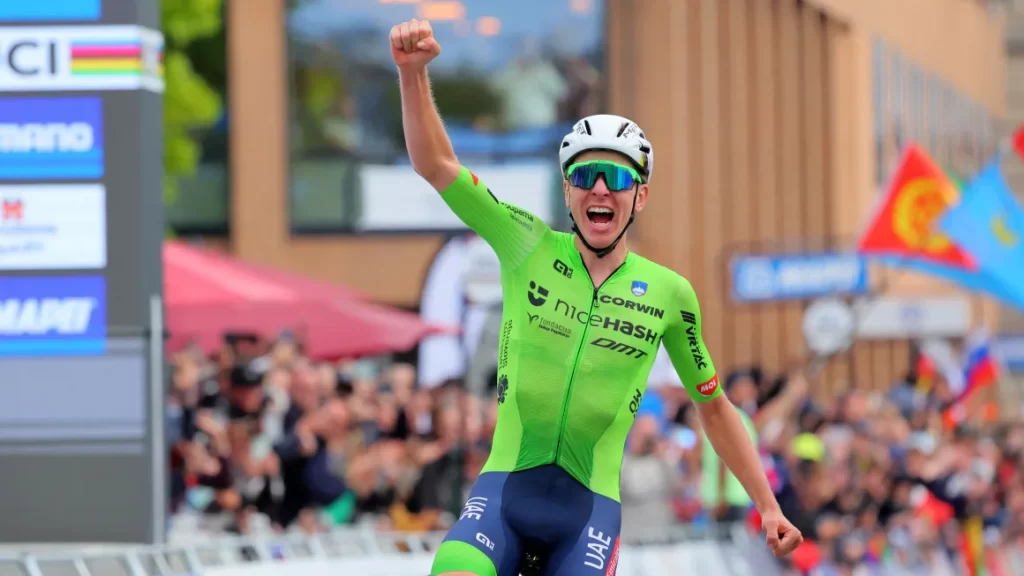Tadej Pogačar Achieves Historic Triple Crown with World Championship Victory
3 min read
Tadej Pogačar celebrates winning the world championship men's road race.

Tadej Pogačar celebrates winning the world championship men's road race.
Tadej Pogačar solidified his status as one of cycling’s greats on Sunday by winning the men’s road race at the world championships in Switzerland. This victory not only secured him the coveted rainbow jersey but also made him the first male cyclist in 37 years to accomplish the remarkable feat of winning the Tour de France, Giro d’Italia, and world championship in the same year—a rare achievement in the sport.
By completing what is known as cycling’s “Triple Crown,” Pogačar joins an elite group that includes legends like Eddy Merckx, Stephen Roche, and Annemiek van Vleuten. While van Vleuten achieved this distinction in 2022, no male cyclist had succeeded since Roche did it in 1987, a time when the competitive landscape was vastly different. In the intervening years, it has become increasingly uncommon for riders to target multiple major victories in one season. Notably, no male cyclist had managed to win both the Tour de France and Giro d’Italia in the same year since 1998 until Pogačar broke that drought this season.
Pogačar’s performance throughout this year has established him as a generational talent. Unusually for a cyclist, he has demonstrated the ability to excel in a variety of race formats, whether it be one-day events or the grueling multi-week stage races. This versatility was particularly evident at the world championships, where the nature of the race requires a combination of explosive power and endurance—qualities that are often at odds in a cyclist’s training regimen.
Reflecting on his achievement, Pogačar admitted, “After many years fighting for the Tour de France and other races, I never had the world championship as a clear goal, but this year everything went smoothly.” He continued, “After the perfect season, it was a really big goal to win the world championship, and I can’t believe it happened.” His words highlight the weight of his accomplishment, especially given the pressures and expectations that accompany such elite-level competition.
Pogačar’s victory in Switzerland was not merely a result of luck; it showcased his tactical brilliance and physical prowess. He launched his decisive attack with just over 100 kilometers remaining in the race, swiftly closing the gap to the early breakaway riders. Initially, he was matched only by France’s Pavel Sivakov, but Pogačar soon pulled away, completing the final 50 kilometers solo and leaving the rest of the field trailing behind.
Discussing his unexpected early attack, Pogačar noted, “We had plans to keep the race under control, but the race went quite early. I don’t know what I was thinking, but I went with the flow, and luckily I made it.” This spontaneous decision underscored his instinctive understanding of racing dynamics, allowing him to seize the moment and convert it into a historic victory.
Pogačar crossed the finish line 34 seconds ahead of Australia’s Ben O’Connor, who claimed the silver medal. The defending champion, Mathieu van der Poel from the Netherlands, rounded out the podium, finishing in third place after leading the chase group.
This latest triumph not only adds to Pogačar’s already impressive resume but also cements his reputation as one of the sport’s most versatile and exciting talents. As he continues to break records and achieve milestones, cycling enthusiasts around the world will be keenly watching to see what he accomplishes next.
Pogačar’s exceptional ability to adapt and excel across various terrains and race formats signifies a new era in professional cycling, where the boundaries of what is possible are continually being pushed. His achievements serve as an inspiration for aspiring cyclists and a reminder of the extraordinary feats that can be accomplished through talent, determination, and a willingness to take risks.
With this remarkable season behind him, Pogačar is poised to further his legacy in the world of cycling, setting his sights on future challenges while basking in the glory of a historic year. As he dons the rainbow jersey, he joins an illustrious lineage of champions, forever etched in the annals of cycling history.